Monthly Archives: May 2017
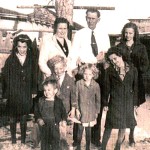 There is an old song, that Willie Nelson wrote in 1980, called On The Road Again, and one part of the lyrics goes like this, “The life I love is makin’ music with my friends.” That line reminds me of a story I heard about my Uncle Larry Byer. My Grandma Byer’s house was the place to be when all the kids were home. There were always kids hanging out there, and because of the varied ages of the siblings, the ages of the visiting children varied quite a bit too. The family had always loved to sing, and several among the family members played an instrument. Grandpa Byer played the mandolin and the violin. Uncle Larry played the guitar and the mandolin, as well as the piano. My dad, Allen Spencer, and Uncle George Hushman also joined in with guitar and singing. It was like a big jam session. For the kids, like my Aunt Sandy Pattan, those jam sessions were like a big party.
There is an old song, that Willie Nelson wrote in 1980, called On The Road Again, and one part of the lyrics goes like this, “The life I love is makin’ music with my friends.” That line reminds me of a story I heard about my Uncle Larry Byer. My Grandma Byer’s house was the place to be when all the kids were home. There were always kids hanging out there, and because of the varied ages of the siblings, the ages of the visiting children varied quite a bit too. The family had always loved to sing, and several among the family members played an instrument. Grandpa Byer played the mandolin and the violin. Uncle Larry played the guitar and the mandolin, as well as the piano. My dad, Allen Spencer, and Uncle George Hushman also joined in with guitar and singing. It was like a big jam session. For the kids, like my Aunt Sandy Pattan, those jam sessions were like a big party.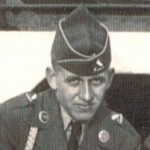
Uncle Larry always had a group of friends who loved to hang out at the house…among them Bobby Boatman, Caryl Sparger, and Gene Tholl. They and the rest of the gang played music and just had a good time in general. Aunt Sandy even told me that they had a machine that recorded the songs and put them on a record. They would hang blankets to make a sound room and record their own songs. I sure wish some of those old records were still around. I would love to hear my dad, grandpa, uncles, and their friends singing and making music with their friends. One of the songs that Uncle Larry used to play for Grandma…his mom…was her favorite, “Springtime in the Rockies.” Grandma loved that song, loved hearing him play and  sing it. It was a song Grandpa always sang to her, so it had a very special meaning. I’m sure it was a sweet love song to her from Grandpa.
sing it. It was a song Grandpa always sang to her, so it had a very special meaning. I’m sure it was a sweet love song to her from Grandpa.
Aunt Sandy told me that when Uncle Larry went into the Army, she really missed him, like most little sisters would. She missed his joking ways, all the friends who came over, and especially, she missed those jam sessions. Nevertheless, when he came home, it wasn’t those things that Aunt Sandy was thinking about. Her big brother was home and all she could think of was to run into his arms for a great big hug. Today would have been Uncle Larry’s 83rd birthday. Happy birthday in Heaven Uncle Larry. I can’t wait to see you again, and get one of those great big hugs too. We love and miss you very much.

 When you are born, the second child in a family, you have the unique blessing of coming home to an older sibling who has just become a big sister or big brother for the first time. That was the exact blessing I got when I was born. I came home to a big sister who was excited about being the big sister. My sister, Cheryl Masterson was an amazing big sister. I have spent my life always knowing that she was there for me, and that is a very comforting feeling. I don’t know if I recognized that feeling as a baby or not, but I certainly have over the years of my life.
When you are born, the second child in a family, you have the unique blessing of coming home to an older sibling who has just become a big sister or big brother for the first time. That was the exact blessing I got when I was born. I came home to a big sister who was excited about being the big sister. My sister, Cheryl Masterson was an amazing big sister. I have spent my life always knowing that she was there for me, and that is a very comforting feeling. I don’t know if I recognized that feeling as a baby or not, but I certainly have over the years of my life.
Cheryl and I were best friends. We did everything together. She showed me how to do so many things, as the years went by, and since I never had the same stylish flair that she did, I have to say she was pretty patient with my awkwardness too. When I needed protection…real or imagined…Cheryl was there too. She was always so brave, while I might very likely hide under the blankets. Maybe that comes with being the oldest, and knowing from a very young age that she was the keeper of the younger kids. Being the oldest is a job that never really passes from a child. It isn’t just about being older in age, but knowing that the younger kids will always look up to you. It changes a person. Cheryl is a different person than I am, in part because she was the oldest, and I never had to pick up those reigns. I wasn’t the oldest child.
These days, I don’t suppose that I need as much monitoring as I used to. Nevertheless, since our parents’ passing, Cheryl always likes to know that we have made it safely from any travel destinations we are on. That is a part of what our parents always did, and something we have all tried to pick up and do now, but I believe it 
 was Cheryl that first picked up that job and carried it on. It is such a keeper of the younger kids thing to do. The oldest child always feels a duty to take care of the younger kids…no matter how old they get. I still enjoy spending time with my sister Cheryl, and as she has been all my life, she is a great blessing to me today. She is my friend and my mentor. She always takes the high road, and does the things that God would want her to do, and that makes her a great mentor. God could not have given me a better big sister. Today is Cheryl’s birthday. Happy birthday Cheryl!! Have a great day!! We love you!!
was Cheryl that first picked up that job and carried it on. It is such a keeper of the younger kids thing to do. The oldest child always feels a duty to take care of the younger kids…no matter how old they get. I still enjoy spending time with my sister Cheryl, and as she has been all my life, she is a great blessing to me today. She is my friend and my mentor. She always takes the high road, and does the things that God would want her to do, and that makes her a great mentor. God could not have given me a better big sister. Today is Cheryl’s birthday. Happy birthday Cheryl!! Have a great day!! We love you!!
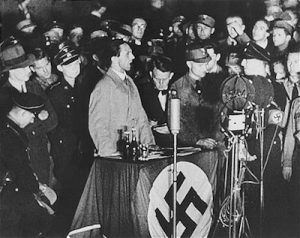 One of the best ways to form a dictatorship is to suppress knowledge. That’s one reason that propaganda is so important. When the people only hear what the government wants them to, they tend to become compliant…or at least that’s the theory. When Adolf Hitler was elected to office, he was the people’s choice, but they had no idea just how evil he was and how long they would be stuck with him. With the end of democracy, Germany became a one-party dictatorship. The Nazis began a massive propaganda campaign to win the loyalty and cooperation of Germans. The Nazi Propaganda Ministry, directed by Dr Joseph Goebbels, took control of all forms of communication in Germany…newspapers, magazines, books, public meetings, and rallies, art, music, movies, and radio. Viewpoints in any way threatening to Nazi beliefs or to the regime were censored or eliminated from all media. The German people were isolated from the outside world, and while they did not like it, the government became their only source of information.
One of the best ways to form a dictatorship is to suppress knowledge. That’s one reason that propaganda is so important. When the people only hear what the government wants them to, they tend to become compliant…or at least that’s the theory. When Adolf Hitler was elected to office, he was the people’s choice, but they had no idea just how evil he was and how long they would be stuck with him. With the end of democracy, Germany became a one-party dictatorship. The Nazis began a massive propaganda campaign to win the loyalty and cooperation of Germans. The Nazi Propaganda Ministry, directed by Dr Joseph Goebbels, took control of all forms of communication in Germany…newspapers, magazines, books, public meetings, and rallies, art, music, movies, and radio. Viewpoints in any way threatening to Nazi beliefs or to the regime were censored or eliminated from all media. The German people were isolated from the outside world, and while they did not like it, the government became their only source of information.
Germany was now led by a self-educated, high school drop-out named Adolf Hitler, who was by nature strongly anti-intellectual. For Hitler, the reawakening of the long-dormant Germanic spirit, with its racial and militaristic 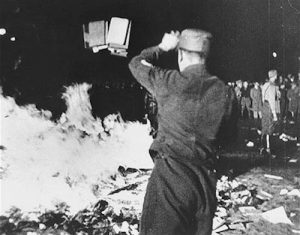 qualities, was far more important than any traditional notions of learning. Books and writings by such authors as Henri Barbusse, Franz Boas, John Dos Passos, Albert Einstein, Lion Feuchtwanger, Friedrich Förster, Sigmund Freud, John Galsworthy, André Gide, Ernst Glaeser, Maxim Gorki, Werner Hegemann, Ernest Hemingway, Erich Kästner, Helen Keller, Alfred Kerr, Jack London, Emil Ludwig, Heinrich Mann, Thomas Mann, Karl Marx, Hugo Preuss, Marcel Proust, Erich Maria Remarque, Walther Rathenau, Margaret Sanger, Arthur Schnitzler, Upton Sinclair, Kurt Tucholsky, Jakob Wassermann, H.G. Wells, Theodor Wolff, Emilé Zola, Arnold Zweig, and Stefan Zweig, were suddenly unGerman. Their books were pulled from libraries and schools. Then, on the night of May 10, 1933, an event unseen in Europe since the Middle Ages occurred as German students from universities once regarded as among the finest in the world, gathered in Berlin to burn books with unGerman ideas. It was the Nazi burning of knowledge. Students can be very impressionable, and easily lead, and these students played right into Hitler’s hand.
qualities, was far more important than any traditional notions of learning. Books and writings by such authors as Henri Barbusse, Franz Boas, John Dos Passos, Albert Einstein, Lion Feuchtwanger, Friedrich Förster, Sigmund Freud, John Galsworthy, André Gide, Ernst Glaeser, Maxim Gorki, Werner Hegemann, Ernest Hemingway, Erich Kästner, Helen Keller, Alfred Kerr, Jack London, Emil Ludwig, Heinrich Mann, Thomas Mann, Karl Marx, Hugo Preuss, Marcel Proust, Erich Maria Remarque, Walther Rathenau, Margaret Sanger, Arthur Schnitzler, Upton Sinclair, Kurt Tucholsky, Jakob Wassermann, H.G. Wells, Theodor Wolff, Emilé Zola, Arnold Zweig, and Stefan Zweig, were suddenly unGerman. Their books were pulled from libraries and schools. Then, on the night of May 10, 1933, an event unseen in Europe since the Middle Ages occurred as German students from universities once regarded as among the finest in the world, gathered in Berlin to burn books with unGerman ideas. It was the Nazi burning of knowledge. Students can be very impressionable, and easily lead, and these students played right into Hitler’s hand.
The youth-oriented Nazi movement had always attracted a sizable following among university students. Even back in the 1920s they thought Nazism was the wave of the future. They joined the National Socialist 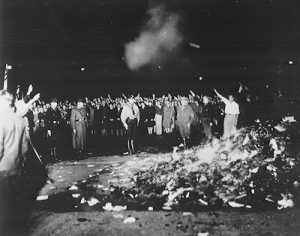 German Students’ League, put on swastika armbands and harassed anti-Nazi teachers. Many formerly reluctant professors were swept along by the outpouring of student enthusiasm that followed Hitler’s seizure of power. Most of the professors eagerly surrendered their intellectual honesty and took the required Nazi oath of allegiance. They also wanted to curry favor with Nazi Party officials in order to grab one of the academic vacancies resulting from the mass expulsion of Jewish professors and deans. The entire education system of a nation changed…almost overnight. As the German-Jewish poet, Heinrich Heine, had declared, a hundred years before the advent of Hitler, “Wherever books are burned, human beings are destined to be burned too.” And so it was in the end.
German Students’ League, put on swastika armbands and harassed anti-Nazi teachers. Many formerly reluctant professors were swept along by the outpouring of student enthusiasm that followed Hitler’s seizure of power. Most of the professors eagerly surrendered their intellectual honesty and took the required Nazi oath of allegiance. They also wanted to curry favor with Nazi Party officials in order to grab one of the academic vacancies resulting from the mass expulsion of Jewish professors and deans. The entire education system of a nation changed…almost overnight. As the German-Jewish poet, Heinrich Heine, had declared, a hundred years before the advent of Hitler, “Wherever books are burned, human beings are destined to be burned too.” And so it was in the end.
 When a volcano erupts, we think of lava and billowing clouds of ash. Those things do happen, but what we don’t think about is what can happen to planes, because of the ash. I suppose that is because we think of that eruption as being a very localized thing. In reality, it isn’t, because the jet stream moves the air around our world, and the ash goes with it. Volcanic ash and airplane engines are not a good mix. Volcanic ash consists of small tephra, which are bits of pulverized rock and glass less than 2 millimeters in diameter created by volcanic eruptions. As the ash enters the atmosphere, it is carried away from the volcano by winds. The ash with the smallest size can remain in the atmosphere for a considerable period of time. The ash cloud can be dangerous to aviation if it reaches the heights of aircraft flight paths.
When a volcano erupts, we think of lava and billowing clouds of ash. Those things do happen, but what we don’t think about is what can happen to planes, because of the ash. I suppose that is because we think of that eruption as being a very localized thing. In reality, it isn’t, because the jet stream moves the air around our world, and the ash goes with it. Volcanic ash and airplane engines are not a good mix. Volcanic ash consists of small tephra, which are bits of pulverized rock and glass less than 2 millimeters in diameter created by volcanic eruptions. As the ash enters the atmosphere, it is carried away from the volcano by winds. The ash with the smallest size can remain in the atmosphere for a considerable period of time. The ash cloud can be dangerous to aviation if it reaches the heights of aircraft flight paths.
Part of the problem is that pilots can’t see ash clouds at night, and ash particles are too small to return an echo to on-board weather radars on commercial airliners. Even when they are flying in daylight, pilots may interpret a visible ash cloud as a normal cloud of water vapor and not a danger…especially if the ash has travelled far from the eruption site. Volcanic ash has a melting point of approximately 2,010° F, which is below the operating temperature of modern commercial jet engines, about 2,550° F. Volcanic ash can damage gas turbines in a number of ways. These can be categorized into those that pose an immediate hazard to the engines and those that present a maintenance problem. As was the case with KLM Flight 867, bound for Anchorage, Alaska, when all four engines flamed out after the aircraft inadvertently entered a cloud of ash blown from erupting Redoubt Volcano, 150 miles away. The volcano had begun erupting 10 hours earlier on that morning of December 15, 1989. Only after the crippled jet had dropped from an altitude of 27,900 feet to 13,300 feet…a fall of more than 2 miles…was the crew able to restart all engines and land the plane safely at Anchorage. The plane required $80 million in repairs, including the replacement of all four damaged engines.
 The 2010 eruptions of Eyjafjallajökull in Iceland, were relatively small for volcanic eruptions. Nevertheless, they caused enormous disruption to air travel across western and northern Europe over the next six days. Additional localized disruption occurred into May 2010. The eruption was declared officially over in October 2010. About 20 countries closed their airspace to commercial jet traffic and it affected about 10 million travelers. This was the highest level of air travel disruption since World War II. It’s strange for us to think that so much can happen to a jet engine is volcanic ash is introduced into it, but that is definitely the case, and if air planes travel in the area of certain types of volcanic ash, planes can be lost. The only prudent thing to do is stop travel in the area…no matter how inconvenient it is to travelers.
The 2010 eruptions of Eyjafjallajökull in Iceland, were relatively small for volcanic eruptions. Nevertheless, they caused enormous disruption to air travel across western and northern Europe over the next six days. Additional localized disruption occurred into May 2010. The eruption was declared officially over in October 2010. About 20 countries closed their airspace to commercial jet traffic and it affected about 10 million travelers. This was the highest level of air travel disruption since World War II. It’s strange for us to think that so much can happen to a jet engine is volcanic ash is introduced into it, but that is definitely the case, and if air planes travel in the area of certain types of volcanic ash, planes can be lost. The only prudent thing to do is stop travel in the area…no matter how inconvenient it is to travelers.
 My niece, Michelle Stevens has always had an artsy flair, so when it came time to decide on a career, there was no real decision to make. She knew that art had to be a part of her life forever. She also knew that she wanted to share her love of art with others, so what better way to do that than to teach art. I know that some people might think of an arts and crafts instructor right about now, but that is nothing like the requirements an art teacher has to have. They have to know how to do every kind of art…painting, sculpting, sketching, and so many others. To be an art teacher, one must be an artist in every sense of the word…and they must also be a teacher.
My niece, Michelle Stevens has always had an artsy flair, so when it came time to decide on a career, there was no real decision to make. She knew that art had to be a part of her life forever. She also knew that she wanted to share her love of art with others, so what better way to do that than to teach art. I know that some people might think of an arts and crafts instructor right about now, but that is nothing like the requirements an art teacher has to have. They have to know how to do every kind of art…painting, sculpting, sketching, and so many others. To be an art teacher, one must be an artist in every sense of the word…and they must also be a teacher.

Looking forward, I can envision Michelle’s life filled with beautiful artwork…moat of which she has made herself. Of course, I don’t know that, it’s just the way I see it. Michelle has always had a artsy flair about her, and now that she has trained for both art and teaching, it is time to take the next turn in the road. School is over and now she is ready to become a teacher of art. The next plan so far is to move back to Casper, and of course, we are very happy about that. We all hope that she will be able to find a teaching position here at home, but of course, that remains to be seen. I think teaching here would be awesome.
 This past weekend marked the final step in Michelle’s education, when she walked across that stage to receive her diploma. The excitement was clearly showing on her face. Her parents and boyfriend were in the audience, almost unable to contain their pride. Years of work were behind her now. She had made the cut. We are all so proud of her and so excited to see where life takes her now. Casper couldn’t possible be blessed with a better art teacher than Michelle. She loves her chosen profession, and the really nice thing is that she can mix her favorite pastime with her career. The future is so bright for her…and so colorful. Congratulations on your college graduation, Michelle!! We are so proud of you and we love you!! The future is yours!!
This past weekend marked the final step in Michelle’s education, when she walked across that stage to receive her diploma. The excitement was clearly showing on her face. Her parents and boyfriend were in the audience, almost unable to contain their pride. Years of work were behind her now. She had made the cut. We are all so proud of her and so excited to see where life takes her now. Casper couldn’t possible be blessed with a better art teacher than Michelle. She loves her chosen profession, and the really nice thing is that she can mix her favorite pastime with her career. The future is so bright for her…and so colorful. Congratulations on your college graduation, Michelle!! We are so proud of you and we love you!! The future is yours!!
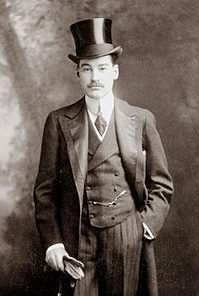 During World War I, the Germans had taken a hard line concerning the waters around England. It was called unrestricted submarine warfare, and it meant that German submarines would attack any ship found in the war zone, which, in this case, was the area around the British Isles…no matter what kind of ship it was, and even if it was from a neutral country. Of course, this was not going to fly, and since Germany was afraid of the United States, they finally agreed to only go after military ships. Nevertheless, mistakes can be made, and that is what happened on May 7, 1915, when a German U-boat torpedoed and sank the RMS Lusitania, a British ocean liner en route from New York to Liverpool, England. Of the more than 1,900 passengers and crew members on board, more than 1,100 perished, including more than 120 Americans. A warning had been placed in several New York newspapers in early May 1915, by the German Embassy in Washington, DC, stating that Americans traveling on British or Allied ships in war zones did so at their own risk. The announcement was placed on the same page as an advertisement of the imminent sailing of the Lusitania liner from New York back to Liverpool. Still this did not stop the sailing of the Lusitania, because the captain of the Lusitania ignored the British Admiralty’s recommendations, and at 2:12 pm on May 7 the 32,000-ton ship was hit by an exploding torpedo on its starboard side. The torpedo blast was followed by a larger explosion, probably of the ship’s boilers, and the ship sank off the south coast of Ireland in less than 20 minutes.
During World War I, the Germans had taken a hard line concerning the waters around England. It was called unrestricted submarine warfare, and it meant that German submarines would attack any ship found in the war zone, which, in this case, was the area around the British Isles…no matter what kind of ship it was, and even if it was from a neutral country. Of course, this was not going to fly, and since Germany was afraid of the United States, they finally agreed to only go after military ships. Nevertheless, mistakes can be made, and that is what happened on May 7, 1915, when a German U-boat torpedoed and sank the RMS Lusitania, a British ocean liner en route from New York to Liverpool, England. Of the more than 1,900 passengers and crew members on board, more than 1,100 perished, including more than 120 Americans. A warning had been placed in several New York newspapers in early May 1915, by the German Embassy in Washington, DC, stating that Americans traveling on British or Allied ships in war zones did so at their own risk. The announcement was placed on the same page as an advertisement of the imminent sailing of the Lusitania liner from New York back to Liverpool. Still this did not stop the sailing of the Lusitania, because the captain of the Lusitania ignored the British Admiralty’s recommendations, and at 2:12 pm on May 7 the 32,000-ton ship was hit by an exploding torpedo on its starboard side. The torpedo blast was followed by a larger explosion, probably of the ship’s boilers, and the ship sank off the south coast of Ireland in less than 20 minutes.
While the sinking of the Lusitania was a horrible tragedy, there were heroics too. One such hero was Alfred Gwynne Vanderbilt, Sr. Vanderbilt was an extremely wealthy American businessman and sportsman, and a member of the famous Vanderbilt family, but on this trip, he was so much more than that. On May 1, 1915, Alfred Vanderbilt boarded the RMS Lusitania bound for Liverpool as a first class passenger. Vanderbilt was on a business trip. He was traveling with only his valet, Ronald Denyer. His family stayed at home in New York. On May 7, off the coast of County Cork, Ireland, German U-boat, U-20 torpedoed the ship, triggering a secondary explosion that sank the giant ocean liner within 18 minutes. Vanderbilt and Denyer immediately went into action, helping others into lifeboats, and then Vanderbilt gave his lifejacket to save a female passenger. Vanderbilt had promised the young mother of a small baby that he would locate an extra life vest for her. Failing to do so, he offered her his own life vest, which he proceeded to tie on to her himself, because she was holding her infant child in her arms at the time.
Vanderbilt had to know he was sealing his own fate, since he could not swim and he knew there were no other life vests or lifeboats available. They were in waters where no outside help was likely to be coming. Still, he 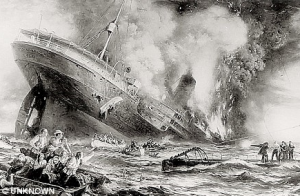 gave his life for hers and that of her child. Because of his fame, several people on the Lusitania who survived the tragedy were observing him while events unfolded at the time, and so they took note of his actions. I suppose that had he not been famous, people would not have known who he was to tell the story. Vanderbilt and Denyer were among the 1198 passengers who did not survive the incident. His body was never recovered. Probably the most ironic fact is that three years earlier Vanderbilt had made a last-minute decision not to return to the US on RMS Titanic. In fact, his decision not to travel was made so late that some newspaper accounts listed him as a casualty after that sinking too. He would not be so fortunate when he chose to travel on Lusitania.
gave his life for hers and that of her child. Because of his fame, several people on the Lusitania who survived the tragedy were observing him while events unfolded at the time, and so they took note of his actions. I suppose that had he not been famous, people would not have known who he was to tell the story. Vanderbilt and Denyer were among the 1198 passengers who did not survive the incident. His body was never recovered. Probably the most ironic fact is that three years earlier Vanderbilt had made a last-minute decision not to return to the US on RMS Titanic. In fact, his decision not to travel was made so late that some newspaper accounts listed him as a casualty after that sinking too. He would not be so fortunate when he chose to travel on Lusitania.
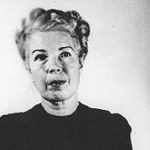 War is tough enough without having a traitor in the mix, and when a traitor is involved, things get even worse. One such traitor of World War II, was Mildred Gillars, aka Axis Sally. Apparently, Gillars, an American, was a opportunist. In 1940, she went to work as an announcer with the Reichs-Rundfunk-Gesellschaft (RRG), German State Radio. At the time, I suppose that she did nothing wrong…up to that point. In 1941, the US State Department was advising American nationals to return home, but Gillars chose to remain because her fiancé, Paul Karlson, a naturalized German citizen, said he would never marry her if she returned to the United States. Then, Karlson was sent to the Eastern Front, where he was killed in action. Gillars still did not return home.
War is tough enough without having a traitor in the mix, and when a traitor is involved, things get even worse. One such traitor of World War II, was Mildred Gillars, aka Axis Sally. Apparently, Gillars, an American, was a opportunist. In 1940, she went to work as an announcer with the Reichs-Rundfunk-Gesellschaft (RRG), German State Radio. At the time, I suppose that she did nothing wrong…up to that point. In 1941, the US State Department was advising American nationals to return home, but Gillars chose to remain because her fiancé, Paul Karlson, a naturalized German citizen, said he would never marry her if she returned to the United States. Then, Karlson was sent to the Eastern Front, where he was killed in action. Gillars still did not return home.
On December 7, 1941, Gillars was working in the studio when the Japanese attack on Pearl Harbor was announced. She broke down in front of her colleagues and denounced their allies in the east. “I told them what I thought about Japan and that the Germans would soon find out about them,” she recalled. “The shock was terrific. I lost all discretion.” This may have been the the last time she had any self respect. She later said that she knew that her outburst could send her to a concentration camp, so faced with the prospect of joblessness or prison, the frightened Gillars produced a written oath of allegiance to Germany and returned to work. She sold out. Her duties were initially limited to announcing records and participating in chat shows, but treason is a slippery slope. Gillars’ broadcasts initially were largely apolitical, but that changed in 1942, when Max Otto Koischwitz, the program director in the USA Zone at the RRG, cast Gillars in a new show called Home Sweet Home. She soon acquired several names amongst her GI audience, including the Berlin Bitch, Berlin Babe, Olga, and Sally, but the one most common was “Axis Sally”. This name probably came when asked on air to describe herself, Gillars had said she was “the Irish type… a real Sally.”
As her broadcasts progressed, Gillars began doing a show called Home Sweet Home Hour. This show ran from December 24, 1942, until 1945. It was a regular propaganda program, the purpose of which was to make US forces in Europe feel homesick. A running theme of these broadcasts was the infidelity of soldiers’ wives and sweethearts while the listeners were stationed in Europe and North Africa. I’m was designed to promote depression. I guess her aversion to the ways of the Japanese and Germans wasn’t so strong after all. She also did a show called Midge-at-the-Mike, which broadcast from March to late fall 1943. I this program, she played American songs interspersed with defeatist propaganda, anti-Semitic rhetoric and attacks on Franklin D. Roosevelt. And she did the GI’s Letter-box and Medical Reports 1944, which was directed at the US home audience. In this show, Gillars used information on wounded and captured US airmen to cause fear and worry in their families. After D-Day, June 6, 1944, US soldiers wounded and captured in France were also reported on. Gillars and Koischwitz worked for a time from Chartres and Paris for this purpose, visiting hospitals and interviewing POWs. In 1943 they had toured POW camps in Germany, interviewing captured Americans and recording their messages for their families in the US. The interviews were then edited for broadcast as though the speakers were well-treated or sympathetic to the Nazi cause. Gillars made her most notorious broadcast on June 5, 1944, just prior to the D-Day invasion of Normandy, France, in a radio play written by Koischwitz, Vision Of Invasion. She played Evelyn, an Ohio mother, who dreams that her son had died a horrific death on a ship in the English Channel during an attempted invasion of Occupied Europe.
After the war, Gillars mingled with the people of Germany, until her capture. Gillars was indicted on September 10, 1948, and charged with ten counts of treason, but only eight were proceeded with at her trial, which began  on January 25, 1949. The prosecution relied on the large number of her programs recorded by the FCC, stationed in Silver Hill, Maryland, to show her active participation in propaganda activities against the United States. It was also shown that she had taken an oath of allegiance to Hitler. The defense argued that her broadcasts stated unpopular opinions but did not amount to treasonable conduct. It was also argued that she was under the hypnotic influence of Koischwitz and therefore not fully responsible for her actions until after his death. On March 10, 1949, the jury convicted Gillars on just one count of treason, that of making the Vision Of Invasion broadcast. She was sentenced to 10 to 30 years in prison, and a $10,000 fine. In 1950, a federal appeals court upheld the sentence. She died June 25, 1988 at the age of 87.
on January 25, 1949. The prosecution relied on the large number of her programs recorded by the FCC, stationed in Silver Hill, Maryland, to show her active participation in propaganda activities against the United States. It was also shown that she had taken an oath of allegiance to Hitler. The defense argued that her broadcasts stated unpopular opinions but did not amount to treasonable conduct. It was also argued that she was under the hypnotic influence of Koischwitz and therefore not fully responsible for her actions until after his death. On March 10, 1949, the jury convicted Gillars on just one count of treason, that of making the Vision Of Invasion broadcast. She was sentenced to 10 to 30 years in prison, and a $10,000 fine. In 1950, a federal appeals court upheld the sentence. She died June 25, 1988 at the age of 87.
 It’s hard to believe that four years have passed since my father-in-law, Walt Schulenberg passed away. Of course, if you asked my mother-in-law, his wife, Joann, he is still here. Alzheimer’s Disease has taken away the memory of his loss, for her anyway. Sometime I think her loss of that memory clouds my own feelings about to too. She often calls my husband, Bob…her son, Walt, and of course, he pretends that he is. Or she asks about him, and we tell her that he went to Walmart. In many ways, her loss of the memory of his passing has kept him closer to all of us. Pretending that he is still here makes is seem real somehow, because the mind makes it seem so.
It’s hard to believe that four years have passed since my father-in-law, Walt Schulenberg passed away. Of course, if you asked my mother-in-law, his wife, Joann, he is still here. Alzheimer’s Disease has taken away the memory of his loss, for her anyway. Sometime I think her loss of that memory clouds my own feelings about to too. She often calls my husband, Bob…her son, Walt, and of course, he pretends that he is. Or she asks about him, and we tell her that he went to Walmart. In many ways, her loss of the memory of his passing has kept him closer to all of us. Pretending that he is still here makes is seem real somehow, because the mind makes it seem so.
 Dad was the glue in the family. Mom might have been too, had Alzheimer’s Disease not taken that spot from her. Dad’s passing brought a different family unit with it. We don’t get together quite as often now. It makes me sad, because I know how much he loved his family, and how important it was to him that we stay close. We have stayed close, just not in quite the same way as it was when he was still with us. Family was everything to him, but of course, he understood how busy people can get. The main thing he would have wanted us to do, is to be there for the love of his life, and in that respect, I know that he knew before he ever left, that we would take good care of her, and so we have.
Dad was the glue in the family. Mom might have been too, had Alzheimer’s Disease not taken that spot from her. Dad’s passing brought a different family unit with it. We don’t get together quite as often now. It makes me sad, because I know how much he loved his family, and how important it was to him that we stay close. We have stayed close, just not in quite the same way as it was when he was still with us. Family was everything to him, but of course, he understood how busy people can get. The main thing he would have wanted us to do, is to be there for the love of his life, and in that respect, I know that he knew before he ever left, that we would take good care of her, and so we have.
 My father-in-law, was a sweet loving man who loved to joke with the family. He loved it when everyone was together and having a great laugh. It made him feel good to know that no matter what, our day had been like, we could come together and enjoy each other’s company. He was a great dad, grandfather, and great grandfather. He loved those babies. I suppose that is why they had six kids of their own. Dad loved to see the kids playing at his house, and he was never too busy to get in there and play too. The years since his passing have flown by, and that makes me especially sad, because I miss him very much. I wish we could go back in time and have our loved ones back, but that just can’t be. I know you are happy in Heaven Dad, and that we will see you again, but I sure miss you in the here and now.
My father-in-law, was a sweet loving man who loved to joke with the family. He loved it when everyone was together and having a great laugh. It made him feel good to know that no matter what, our day had been like, we could come together and enjoy each other’s company. He was a great dad, grandfather, and great grandfather. He loved those babies. I suppose that is why they had six kids of their own. Dad loved to see the kids playing at his house, and he was never too busy to get in there and play too. The years since his passing have flown by, and that makes me especially sad, because I miss him very much. I wish we could go back in time and have our loved ones back, but that just can’t be. I know you are happy in Heaven Dad, and that we will see you again, but I sure miss you in the here and now.
 Every war has one thing in common…there are two opposing sides. That can make for a volatile situation, even years after the war is over. Take our own Civil War. That war ended in 1865, but to this day, there are those who think we should tear down any and all memorials to the heroes of the South, which of course, lost the war. It’s a tough situation, but when you think about it, is a general from the South any less brave in battle. It is all a part of he fabric that forms our nation. They did not win the war, but as we have all told our children about sports, “It’s not whether you win or lose, but how you played the game.” Now, I know that war isn’t a game, although some have indicated that it is, nevertheless, most soldiers from the South fought as bravely and as honorably as those from the north. Everyone knows that the Confederate flag is not the flag of the United States, but it is a piece of it’s history, and history is history. It is not something we should be defacing, but rather honoring, because the fought the good fight.
Every war has one thing in common…there are two opposing sides. That can make for a volatile situation, even years after the war is over. Take our own Civil War. That war ended in 1865, but to this day, there are those who think we should tear down any and all memorials to the heroes of the South, which of course, lost the war. It’s a tough situation, but when you think about it, is a general from the South any less brave in battle. It is all a part of he fabric that forms our nation. They did not win the war, but as we have all told our children about sports, “It’s not whether you win or lose, but how you played the game.” Now, I know that war isn’t a game, although some have indicated that it is, nevertheless, most soldiers from the South fought as bravely and as honorably as those from the north. Everyone knows that the Confederate flag is not the flag of the United States, but it is a piece of it’s history, and history is history. It is not something we should be defacing, but rather honoring, because the fought the good fight.
President Regan felt the same way when he visited Germany on May 5, 1985. The Holocaust was a horrible 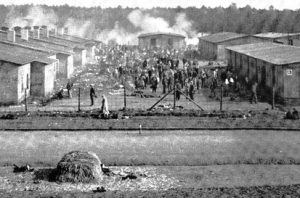 event, and not one that the majority of the German people agreed with, but they were in a difficult place too. They were following orders. Had they not done so, they would have been killed…here was no doubt. So, when Reagan went to Germany and to the cemeteries of the fallen German soldiers, should he have been disrespectful…of course not. He was a visitor in their country, and whether their politics was right or wrong, these were their fallen heroes. They were fathers, sons, brothers, uncles, grandfathers to someone in Germany, and they were loved. As Reagan said that day, “Here they lie. Never to hope. Never to pray. Never to love. Never to heal. Never to laugh. Never to cry.” Lives taken…too soon, by war, and that made them a nation’s heroes.
event, and not one that the majority of the German people agreed with, but they were in a difficult place too. They were following orders. Had they not done so, they would have been killed…here was no doubt. So, when Reagan went to Germany and to the cemeteries of the fallen German soldiers, should he have been disrespectful…of course not. He was a visitor in their country, and whether their politics was right or wrong, these were their fallen heroes. They were fathers, sons, brothers, uncles, grandfathers to someone in Germany, and they were loved. As Reagan said that day, “Here they lie. Never to hope. Never to pray. Never to love. Never to heal. Never to laugh. Never to cry.” Lives taken…too soon, by war, and that made them a nation’s heroes.
No two sides will ever agree, and emotions run high after a war, but sometimes people take things too far…retaliating for things they believe were wrong, years and even centuries after the events took place. The dead  are dead, and their memorials should be left alone, whether they are private, state, or national. To someone, somewhere, their efforts were heroic, and just because we have a different view of the things they stood for, does not give is the right to terrorize their graves and memorials. I suppose that many people would argue this point with me, and let it be known that I am not condoning the wrongs done by evil nations, I an simply saying that we should leave the memorials alone, because they do no harm. If people want to make a statement, they should teach their children right from wrong, so that they understand the difference between a cause, and a heroic soldier of that cause. One could arguably be condemned, while the other should not be.
are dead, and their memorials should be left alone, whether they are private, state, or national. To someone, somewhere, their efforts were heroic, and just because we have a different view of the things they stood for, does not give is the right to terrorize their graves and memorials. I suppose that many people would argue this point with me, and let it be known that I am not condoning the wrongs done by evil nations, I an simply saying that we should leave the memorials alone, because they do no harm. If people want to make a statement, they should teach their children right from wrong, so that they understand the difference between a cause, and a heroic soldier of that cause. One could arguably be condemned, while the other should not be.
 While Germany was willing to go to war, they had, nevertheless, a healthy fear of the United States. During World War I, Germany introduced unrestricted submarine warfare. It was early 1915, and Germany decided that the area around the British Isles was a war zone, and all merchant ships, including those from neutral countries, would be attacked by the German navy. That action set in motion a series of attacks on merchant ships, that finally led to the sinking of the British passenger ship, RMS Lusitania on May 7, 1915. It was at this point that President Woodrow Wilson decided that it was time to pressure the German government to curb their naval actions. Because the German government didn’t want to antagonize the United States, they agreed to put restrictions on the submarine policy going forward, which angered many of their naval leaders, including the naval commander in chief, Admiral Alfred von Tirpitz, who showed his frustration by resigning in March 1916.
While Germany was willing to go to war, they had, nevertheless, a healthy fear of the United States. During World War I, Germany introduced unrestricted submarine warfare. It was early 1915, and Germany decided that the area around the British Isles was a war zone, and all merchant ships, including those from neutral countries, would be attacked by the German navy. That action set in motion a series of attacks on merchant ships, that finally led to the sinking of the British passenger ship, RMS Lusitania on May 7, 1915. It was at this point that President Woodrow Wilson decided that it was time to pressure the German government to curb their naval actions. Because the German government didn’t want to antagonize the United States, they agreed to put restrictions on the submarine policy going forward, which angered many of their naval leaders, including the naval commander in chief, Admiral Alfred von Tirpitz, who showed his frustration by resigning in March 1916.
On March 24, 1916, soon after Tirpitz’s resignation, a German U-boat submarine attacked the French passenger steamer Sussex, in the English Channel, thinking it was a British ship equipped to lay explosive mines. It was apparently an honest mistake, and the ship did not sink. Still, 50 people were killed and many  more injured, including several Americans. On April 19, in an address to the United States Congress, President Wilson took a firm stance, stating that unless the Imperial German Government agreed to immediately abandon its present methods of warfare against passenger and freight carrying vessels the United States would have no choice but to sever diplomatic relations with the Government of the German Empire altogether.
more injured, including several Americans. On April 19, in an address to the United States Congress, President Wilson took a firm stance, stating that unless the Imperial German Government agreed to immediately abandon its present methods of warfare against passenger and freight carrying vessels the United States would have no choice but to sever diplomatic relations with the Government of the German Empire altogether.
After Wilson’s speech, the US ambassador to Germany, James W. Gerard, spoke directly to Kaiser Wilhelm on May 1 at the German army headquarters at Charleville in eastern France. After Gerard protested the continued German submarine attacks on merchant ships, the Kaiser in turn denounced the American government’s compliance with the Allied naval blockade of Germany, in place since late 1914. Nevertheless, Germany could not risk American entry into the war against them, so when Gerard urged the Kaiser to provide assurances of a change in the submarine policy, the Kaiser agreed.
On May 6, the German government signed the so-called Sussex Pledge, promising to stop the indiscriminate sinking of non-military ships. According to the pledge, merchant ships would be searched, and sunk only if they 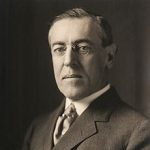 were found to be carrying contraband materials. Furthermore, no ship would be sunk before safe passage had been provided for the ship’s crew and its passengers. Gerard was skeptical of the intentions of the Germans, and wrote in a letter to the United States State Department that “German leaders, forced by public opinion, and by the von Tirpitz and Conservative parties would take up ruthless submarine warfare again, possibly in the autumn, but at any rate about February or March, 1917.” Gerard was right, and on February 1, 1917, Germany announced the resumption of unrestricted submarine warfare. Two days later, Wilson announced a break in diplomatic relations with the German government, and on April 6, 1917, the United States formally entered World War I on the side of the Allies.
were found to be carrying contraband materials. Furthermore, no ship would be sunk before safe passage had been provided for the ship’s crew and its passengers. Gerard was skeptical of the intentions of the Germans, and wrote in a letter to the United States State Department that “German leaders, forced by public opinion, and by the von Tirpitz and Conservative parties would take up ruthless submarine warfare again, possibly in the autumn, but at any rate about February or March, 1917.” Gerard was right, and on February 1, 1917, Germany announced the resumption of unrestricted submarine warfare. Two days later, Wilson announced a break in diplomatic relations with the German government, and on April 6, 1917, the United States formally entered World War I on the side of the Allies.

